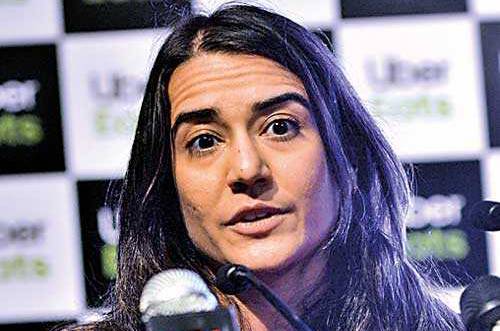Popular food delivery app Uber Eats is savouring its success as it completes one year and plans to further expand investment in the country, improve quality and encourage more women to join its ranks.
Uber Eats this week said it delivered over three million meals in its first year of operations, currently limited to Colombo and Kandy. The single largest order from Uber Eats was worth Rs. 51,000 while one customer had placed over 700 orders.
Additionally, a delivery partner satiated cravings of hundreds of customers by single-handedly completing around 4,900 orders. Uber Eats said these highlights confirm the trust Sri Lankan consumers place in the brand’s promise and service.
“Sri Lanka is looked upon as a very lucrative market by Uber Eats. Before entering this market, we did our research but a year later the performance in this market has surpassed all our expectations. As a result, Uber Eats globally sees Sri Lanka as a key market to invest in,” Uber Eats Sri Lanka Lead Bhavna Dadlani told the Daily FT on the sidelines of its first anniversary celebrations in Colombo on Tuesday.
She said in less than 12 months, Uber Eats has expanded to two main cities in the island with plans underway to further expand to the suburbs.
Given their success in the past year, Uber Eats intends to focus on all three key pillars of their business — customers, delivery partners and restaurants.
“We want to continue to innovate and provide more convenience as well as selection for our customers, while we are focused on enhancing earning potentials for restaurant partners by introducing new concepts to the market like virtual restaurants and cloud kitchens. As far as the delivery partners are considered, we want to continually empower them to be financially independent, particularly the females,” Dadlani pointed out.
“We will strive to provide unparalleled convenience to all our consumers. Keeping the average delivery time within 30 minutes, we believe Uber Eats has changed the landscape of how we consume food in Sri Lanka. Our seamless technology has transitioned the country from call-based long-delivery to a click of a button. Marking our first anniversary, we are truly humbled by the phenomenal response received in Sri Lanka,” she added.
Since its inception in October last year, Uber Eats has succeeded in dominating the market and making Sri Lanka one of its fastest-growing markets.
“We started covering just Colombo 2 to Colombo 8 and we have now expanded to Ja-Ela, Moratuwa and east to Malabe. We also commenced operations in Kandy this August, focusing only on the city centre and we have already expanded to Peradeniya and Katugastota. Over the next few weeks and months, we will continue to expand further into the suburbs of both these cities. The response from our consumers has been incredible,” Dadlani revealed.
She also said Uber Eats provided new economic opportunities for every restaurant partner on the platform.
“We want to create growth for our restaurant partners. During the first year of Uber Eats’ operations in Sri Lanka, we have seen that a number of our restaurant partners have expanded operations or have opened up new outlets since joining us. We have offered restaurants visibility as well as valuable insights to grow their business,” she stressed.
Living up to its motto of make eating effortless at any time for anyone, Uber Eats in Sri Lanka offers a diverse set of 34 cuisines on the app, with a growing number of restaurants registering on the platform every week.
“The number of restaurants has grown up to four digits as of now and it’s on the rise,” she divulged.
Dadlani said the platform had presented the opportunity for a variety of restaurants, from home kitchens to SME businesses, to grow into larger and global business chains.
Commenting on the support received from the Colombo Municipal Council (CMC) to raise the quality and standards of food delivery during its first year of operation, she asserted that they intended to work closely and further strengthen the partnership to ensure quality within the food industry. At present, the platform allows restaurants to sign up based on certifications and customer ratings and comments.
She also highlighted that Uber Eats was committed to the ethos of inclusive growth and to providing individuals from all walks of life with a chance to earn a livelihood.
“We have partnered a number of female and other marginalised communities who did not previously have access to economic opportunities under the umbrella ‘Uber Diviyata Diriya’. We are proud to aggressively take on board women and those from marginalised communities as delivery partners, all of whom chose the platform to start their journey as entrepreneurs,” she said.
Dadlani also noted that their partners were able to earn flexibly on the platform when they wanted and in a safe environment.
“We have martial arts classes for female delivery partners for self-defence and have partnered with some of our restaurants to find sanitation solutions for our delivery partners while they are on the road,” she added.
She also stated that all Uber Eats delivery partners were provided with full insurance cover while on trips.
“Uber Eats has an exciting opportunity to meet everyday eating needs in Sri Lanka and in doing so, it can address the important needs of their other partners as well,” she added.
“This wouldn’t be a success if not for our restaurant partners who keep cooking up delicious dishes, our delivery partners who work relentlessly on the road to ensure your food is delivered at Uber speed and customers who have believed in our brand since day one. Increased aspirations, the skyrocketing number of consumers going online as well as high-speed internet and mobile penetration are all a perfect recipe for Uber Eats to continue investing in Sri Lanka. All this in one year and we are just getting started,” Dadlani said.
(FT)

